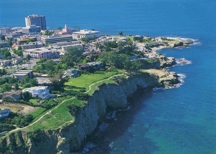- The added line is THIS COLOR.
- The deleted line is THIS COLOR.
*Program [#qc13d52d]
**Keynote Speakers [#xaa6a16c]
*Program
**Keynote Speakers
#html{{
<table border="0">
<tr><td valign="top"><img src="./image/ak2008.jpg"><br/><br/></td>
<td valign="top"><i><b>Dr. Alan Kay</b></i>, Viewpoints Research Institute, USA
<tr><td valign="top"><img src="./image/SmarrHiResCloseup.jpg"></td>
<td valign="top"><i><b>Dr. Larry Smarr</b></i>, Director, Calit2 and Professor, Computer Science & Engineering, Jacobs School of Engineering, UCSD<br/><br/>
Larry Smarr became founding director in 2000 of the California Institute for Telecommunications and Information Technology (Calit2), a University of California San Diego/UC Irvine partnership. He holds the Harry E. Gruber professorship in the Jacobs School’s Department of Computer Science and Engineering at UCSD. For the previous 15 years as founding director of the National Center for Supercomputing Applications Smarr helped drive major developments in the planetary information infrastructure: the Internet, the Web, scientific visualization, virtual reality, and global telepresence. Smarr serves as PI on the NSF’s OptIPuter and the Moore Foundation’s CAMERA microbial metagenomics projects. <br/>
<br/>
Smarr was a member of the President’s Information Technology Advisory Committee for President Clinton and served until 2005 on the Advisory Committee to the Director of the National Institutes of Health and the NASA Advisory Council. He is a member of the National Academy of Engineering and a Fellow of the American Physical Society and the American Academy of Arts and Sciences. In 2006 he received the IEEE Computer Society Tsutomu Kanai Award for his lifetime achievements in distributed computing systems. <br/><br/><br/>
</td></tr>
<tr><td valign="top"><img src="./image/druin2008.jpg"></td>
<td valign="top"><b>What Children Can Teach Us</b><br/><i><b>Dr. Allison Druin</b></i>, University of Maryland, USA<br/><br/>
Allison Druin is the Director of the Human-Computer Interaction Lab
(HCIL) and an Associate Professor in the University of Maryland's
College of Information Studies. She leads interdisciplinary research
teams of librarians, educational researchers, computer scientists,
artists, classroom teachers and children to create new educational
technologies for elementary school children. Her work has included:
developing digital libraries for children; designing technologies for
families; and creating collaborative storytelling technologies for the
classroom. Dr. Druin's most widely used work is the "International
Children's Digital Library" (ICDL) www.childrenslibrary.org, now the
largest digital library in the world for children and a non-profit
foundation, the ICDL Foundation. For the past three years she has been
a Commissioner on the U.S. National Commission on Libraries and
Information Science, appointed by the White House and confirmed by the
U.S. Senate. She is the author or editor of three books: Designing
Multimedia Environments for Children (Wiley, 1996), The Design of
Children's Technology (Morgan Kaufmann, 1999) and Robots for Kids
(Morgan Kaufmann, 2000). She received her Ph.D. in 1997 from the
University of New Mexico, her M.S. in 1987 from the MIT Media Lab, and a
B.F.A. from Rhode Island School of Design in 1985. <br/><br/></td></tr>
<tr><td valign="top"><img src="./image/ta2008.jpg"></td>
<td valign="top"><b>Evolution of Digital Content</b><br/><i><b>Dr. Tomonori Aoyama</b></i>, Keio University, Japan<br/><br/>
Dr. Tomonori Aoyama joined NTT Public Corporation in 1969, and then he had been engaged in research and development on communication networks and systems in the Electrical Communication Laboratories. From 1973 to 1974, he stayed in MIT as a visiting scientist to study digital signal processing technology. In 1994, he was appointed to Director of NTT Opto-Electronics Laboratory, and in 1995 he became Director of NTT Optical Network Systems Laboratory. In 1997, he left NTT, and joined the University of Tokyo as Professor in Graduate School of Information Science and Technology. Since April 2006, he is Professor of Research Institute for Digital Media and Content at Keio University. His research activity covers new generation networking technologies including photonic networking, ubiquitous networking and broadband applications with super high definition images.
He is an IEEE Fellow, IEICE (Institute of Electronics, Information and Communication Engineers, Japan) Fellow, and a member of Science Council of Japan. He is currently the President-elect of IEICE. He serves as Program Coordinator for the new generation network architecture in National Institute of Information and Communications Technology (NICT). He also serves as Chairman of Photonic Internet Forum (PIF), and as Vice-Chair of New Generation Network Promotion Forum and Ubiquitous Networking Forum. He is President of NPO- Digital Cinema Consortium of Japan (DCCJ).
<tr><td valign="top"><img src="./image/Vinge.jpg"></td>
<td valign="top"><i><b>Dr. Vernor Vinge</b></i>, Novelist & Retired Professor of Computer Science, San Diego State University<br/><br/>
Vernor Vinge holds a PhD(Math) from University of California, San Diego. From 1972 to 2000 he taught in the Department of Math and Computer Sciences at San Diego State University. He has now
retired from SDSU in order to write science-fiction full time. <br/>
<br/>
In 1982, at a panel for AAAI-82, he proposed that in the near future technology would accelerate the evolution of intelligence leading to a kind of "singularity" beyond which merely human extrapolation was essentially impossible. In the 1980s and 1990s, he elaborated on this theme, both in his science fiction and nonfiction. Vinge sold his first science-fiction story in 1964. His novella "True Names" (1981), is one of the earliest stories about cyberspace. His most recent novel, "Rainbows End" (2006), looks at the impact of wearable computing and smart environments on issues of entertainment, privacy, and terror. Vinge has won five Hugos, including three for best novel.
<br/>
</td></tr>
</table>
}}
**Conference Program (Tentative) [#uddd649a]
***January 19th, 2009 [#g3d81c2f]
''Workshop on Inclusive Design'', Organized by Dr. Shiose, Kyoto University.~
***January 20th, 2009 [#s9eec23e]
''Keynote Talks'' by Dr. Allison Druin and Dr. Alan Kay~
''Paper Presentation Sessions''~
''Conference Banquet''
***January 21st, 2009 [#e37fc02e]
''Keynote Talk'' by Dr. Tomonori Aoyama~
''Paper Presentation Sessions''
***January 22nd, 2009 [#s67c3f4c]
''Unconference Sessions'' including demos, posters, BOFs, discussions, etc.
**Paper Presentation [#p513dc4a]
Detailed program will be available in December.
**Advance Program
***January 25
: 14:00 - | Registration
: 15:00 - 15:15 | Opening
: 15:15 - 16:15 | Keynote Talk
:: Experiments in Living in the Virtual/Physical World | '''Dr. Larry Smarr'''
: 17:00 - | Reception
***January 26
: 9:00 - 10:30 | Paper Presentation: Programming
:: Splish: A Visual Programming Environment for Arduino to Accelarate Physical Computing Experiences | '''Yoshiharu Kato'''
:: CodeTalk-Conversations About Code |
'''Bastian Steinert, Marcel Taeumel, Jens Lincke, Tobias Pape and Robert Hirschfeld'''
:: The Collaboration Platform: a Cooperative Course Case-Study |
'''Luís Duarte and Luís Carriço'''
: 10:30 - 11:00 | Break
: 11:00 - 12:30 | Paper Presentation: Support for Understanding
:: Effects of All-for-one-type Support in Multilingual Conference Support System | '''Mai Miyabe and Takashi Yoshino'''
:: Using Zuzie2 to Exchange Viewpoints for a Broader Outlook | '''Koji Yokokawa and Takeshi Sunaga'''
:: Activity-aware chat system based on a study of distributed collaborative learning | '''Tomoo Inoue'''
: 12:30 - 14:30 | Lunch Break
: 14:30 - 15:30 | Keynote Talk
:: Technology and New Populisms | '''Dr. Vernor Vinge''':
: 15:30 - 16:00 | Break
: 16:00 - 17:00 | Lab Tour (4K Auditorium, StarCAVE, VirtuLab, HIPerSpace)
***January 27
: 9:00 - 10:30 | Paper Presentation: Insight into Collaboration
:: An Agent-Based Approach to Evaluation of Workflow Support Systems |
'''Hiroki Saito, Tetsuya Abe, Kenji Ohira, Kokolo Ikeda, Mikihiko Mori, Tetsutaro Uehara and Hajime Kita'''
:: A Comparison of Four Post-Cognitive Theories in Collaboration Context |
'''George Mathew'''
:: The Unconventional Interaction Library: Tackling the Use of Physiological Interaction Modalities |
'''Luís Duarte and Luís Carriço'''
: 10:30 - 11:00 | Break
: 11:00 - 12:00 | Paper Presentation: Mobile Ad-hoc Collaboration
:: A Serverless Instant Messaging Protocol for Mobile Ad-hoc Networks |
'''Anthony Urso'''
:: Overseer: A Mobile Context-Aware Collaboration and Task Management System for Disaster Response |
'''Faisal Luqman and Martin Griss'''
: 12:00 - 14:00 | Lunch Break
: 14:00 - 15:00 | Lightning Sessions
: 15:00 - 16:00 | Lab Tour (4K Auditorium, StarCAVE, VirtuLab, HIPerSpace)
: 16:00 - 16:30 | Closing



